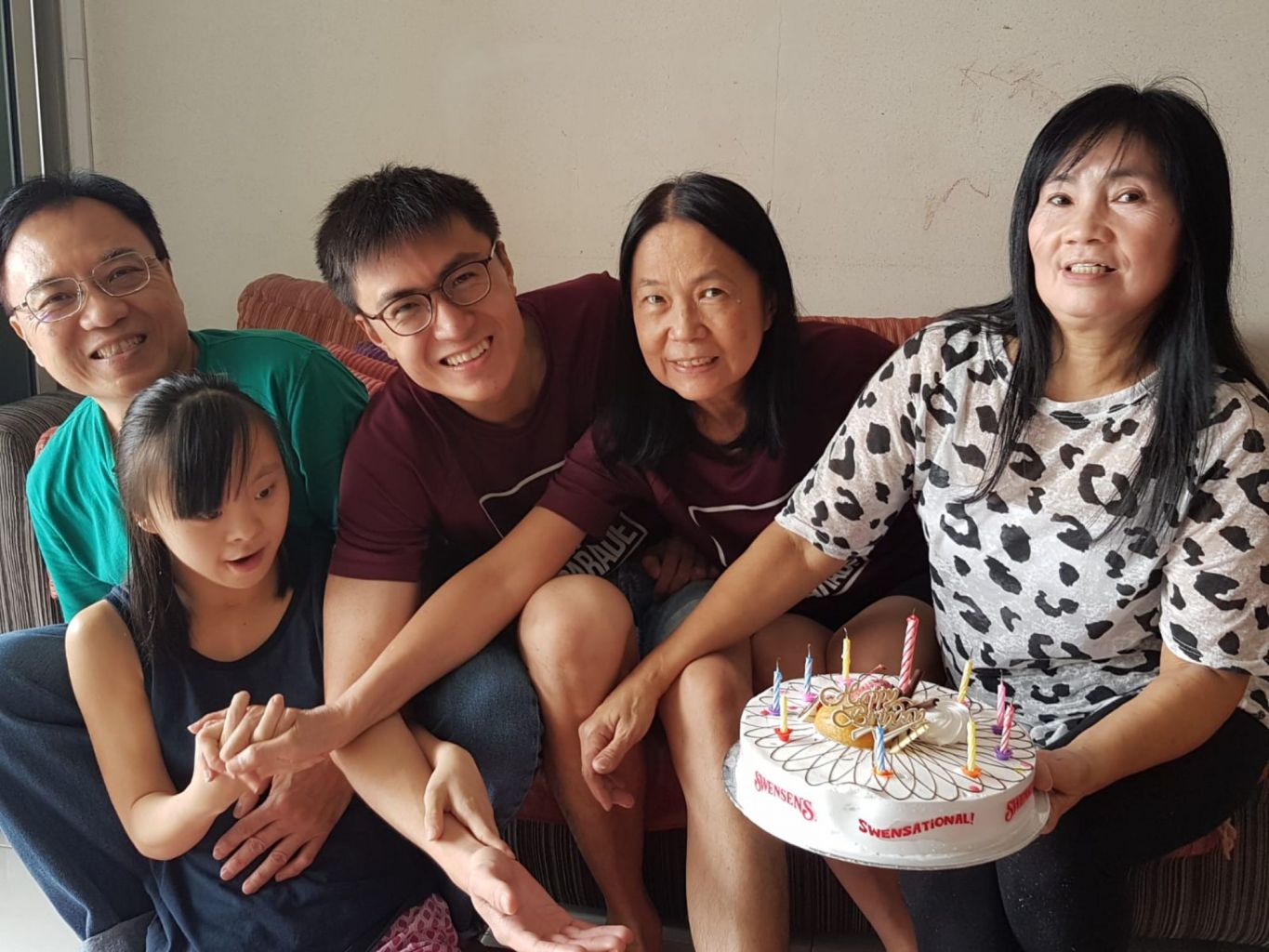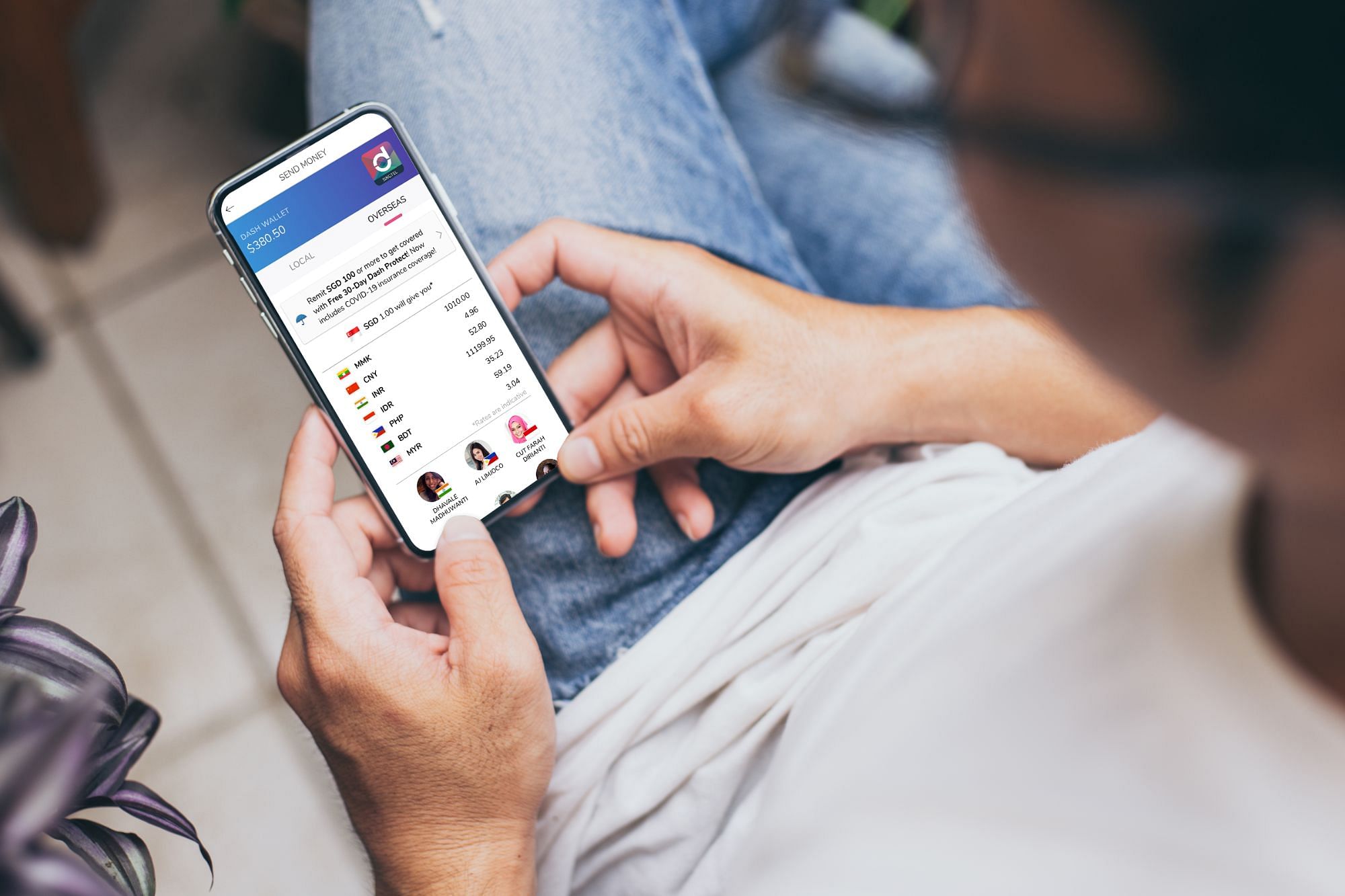BRANDED CONTENT
Help from an app for foreign workers
Foreign workers face unique problems, including fears over their dependants’ well-being, amid lockdowns and travel restrictions. How do they cope and what can employers do to help?

Mrs Cristina Furtin Talastas (with cake) has been with the Lim family for the last 27 years. Pictured with her is (from left) Mr Samuel Lim, his two children and wife. PHOTO: SAMUEL LIM
Ease of sending money home is a 'blessing'
After Mrs Cristina Furtin Talastas lost her husband to a heart attack 20 years ago, she became her family's sole breadwinner and was forced to continue working outside the Philippines to provide a better life for them.
"When my husband passed away, there was nobody to look after my children and pay for their studies," she says.
To continue supporting her family financially, Mrs Talastas returned to Singapore where she had been working as a domestic helper. Her three kids were left under the care of her parents, in-laws and sister in the Philippines.
For the last 27 years, Mrs Talastas has been living and working as a domestic helper with Mr Samuel Lim's family in their five-room Housing Board flat in Toa Payoh. The 58-year-old treats the Lims like her second family and has been there for the birth of their two children.
The year her husband died, the Lims welcomed their second child - a daughter born with Down syndrome. The new addition to the Lim family gave her purpose, even with the loss of her spouse, and motivated her to continue working with them.
Mr Lim, 62, who is self-employed, stresses that Mrs Talastas is invaluable to his family.
"A special needs child has a host of issues when they are born and Cristina has been with us throughout this period," he says.
Aside from caring for Mr Lim's family, the domestic helper also supports her family back home by sending money to her parents, sister and three children twice a month.
She has been doing so with the help of the Singtel Dash mobile wallet since 2015.
The mobile application, which customers from all telcos can download for free on their smartphones, lets users remit money to seven countries in the region without visiting a physical remittance outlet. It also lets users make in-store and online payments and pay for public transportation with their smartphones.

Mr Lim says: "Before using Dash, I had to make trips to the post office or Lucky Plaza to remit money on her behalf." Now, he is able to transfer Mrs Talastas' salary directly to her mobile wallet so she can instantly remit money to her family.
The services offered by Dash have proven especially critical amid stricter circuit breaker measures and travel lockdowns, adds Mrs Talastas. Her family has been unable to work over the past few months because her home town in Luzon, the Philippines' largest island, has been on lockdown since March 16.
She finds it a blessing to be able to instantly remit money home to help her family through this difficult period.
Other employers have also come to appreciate its convenience. Lawyer Karen Wee, 47, says: "Dash has been a true convenience both for myself and my helper, Marilou." It saves her the time and hassle of withdrawing cash and queueing at a physical remittance outlet on behalf of her domestic helper.
It also allows her to "do our part by staying home while ensuring that her (Marilou's) family receives money safely and quickly."
She is among the number of new users that Singtel says has doubled between February and April, with a 70 per cent increase in remittance volumes.
Mr Gilbert Chuah, head of Mobile Financial Services, Singtel's International Group, says: "Digital services like Dash have become much more critical for consumers and businesses as they provide a safe alternative to many everyday tasks that take people out of their homes, including shopping for necessities and remitting money."
So near, so far on son's first birthday
Monday (May 18) will be bittersweet for Ms Goh Ai Chin. Her son turns one that day, but she won't be by his side in Malaysia.
A mere strip of sea - the Johor Strait - and the Covid-19 outbreak keep her away from celebrating her baby's auspicious milestone.
The 30-year-old Malaysian and her husband used to travel across the Tuas Second Link daily for work, but have been separated from their only child since March 16 when Malaysia announced a nationwide movement restriction order.

Ms Goh and her husband are among some 400,000 Malaysians who cross the borders daily to work or study in Singapore. Unlike migrant workers living in Singapore on a long-term basis, most Malaysians who enter Singapore are used to returning home every day.
With the circuit breaker restrictions, Ms Goh and her husband have had to sacrifice returning home to continue working.
"We decided to stay in Singapore as we had jobs and would be able to continue working to support our son, who is now in the care of a babysitter," she says.
Ms Goh works as a sales assistant in Jurong West. Her 38-year-old husband is a technician. The young couple has been living separately in Singapore for weeks to save money.
Initially, Ms Goh's employer arranged for her to stay at a rental Housing Board flat in Jurong West. She later moved to a friend's family flat in Tampines where she now rents a room. Her husband is renting a room in Ang Mo Kio.
Their current living arrangement has forced them to cancel the party they had planned for their son. Instead, Ms Goh and her husband will be arranging a video call with him and his babysitter.
"A video call with him is the only thing we can do right now," she sighs.
Besides the emotional pain of being apart, the couple is also struggling with a practical concern: How can they send money home? It is something that they have never had to worry about because of their previous daily commute.
As a result of the outbreak, Ms Goh has had to look for ways to pay for bills back in Malaysia while observing social distancing measures during Singapore's circuit breaker period.
She found a solution in Singtel Dash, which enables her to send money to her babysitter and pay for other expenses without having to leave her place of residence. The mobile wallet's key selling points include competitive foreign exchange rates and transaction fees for online money transfers.
Even as Ms Goh adapts to the new normal with the help of such technologies, she is looking forward to the day when travel restrictions are lifted so she can be with her son again.
"Depending on the situation, I may have to wait another week or so before I can finally see him. Of course I miss my child, but we worry about safety and know there isn't much else we can do."
Mr Chuah of Singtel International Group adds: "Many foreign workers based in Singapore are sole breadwinners in their families and the remittance services provided by Dash is one of the ways we are able to rally behind them and relieve some of the burden they face in these challenging circumstances."
How Dash eases concerns over cash flow
Singtel Dash lets users remit money from where they are without the need to leave home or queue at remittance outlets.
How it works: Users top up their Dash wallets with their local online bank account, or with cash at 7-Eleven stores and Singtel shops. Users can then remit money to bank accounts, mobile wallets and cash pick-up points in their home countries. Peer-to-peer transfers can also be made between Dash wallets.
At present, Dash offers mobile remittance services to seven countries in the region: Bangladesh, China, India, Indonesia, Malaysia, Myanmar and the Philippines. Dash users can also use the app to make online and in-store payments for goods and services globally.
More help for foreign workers
Singtel has introduced new initiatives on Dash to help those who wish to remit money.
- Complimentary* remittance for healthcare workers
- One-time complimentary* remittance and $3 cashback for all new users
- Free^ 30-day insurance (includes coverage for Covid-19) for remittance of at least $100
*Complimentary remittance and cashback valid till 1 June 2020. ^ Free insurance is valid till 31 May 2020 and is protected up to specified limits by SDIC. Underwritten and issued by NTUC Income. T&Cs apply. Visit dash.com.sg/remit for info.
The Singtel Dash app can be downloaded for free on iOS and Android devices by clicking here or scanning the QR code.


